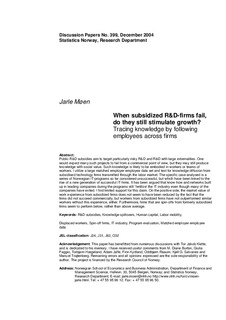| dc.description.abstract | Public R&D subsidies aim to target particularly risky R&D and R&D with large externalities. One
would expect many such projects to fail from a commercial point of view, but they may still produce
knowledge with social value. Such knowledge is likely to be embodied in workers or teams of
workers. I utilize a large matched employer-employee data set and test for knowledge diffusion from
subsidised technology firms transmitted through the labor market. The specific case analysed is a
series of Norwegian IT-programs so far considered unsuccessful, but which have been linked to the
rise of a new generation of successful IT-firms. It has been argued that know-how and networks built
up in leading companies during the programs still `fertilize' the IT-industry even though many of the
companies have exited. I find limited support for this claim. On the positive side, the market value of
work experience from subsidized firms does not seem to have been reduced by the fact that the
firms did not succeed commercially, but workers from subsidized firms have not outperformed similar
workers without this experience, either. Furthermore, firms that are spin-offs from formerly subsidized
firms seem to perform below, rather than above average.
Keywords: R&D-subsidies, Knowledge spillovers, Human capital, Labor mobility,
Displaced workers, Spin-off firms, IT-industry, Program evaluation, Matched employer-employee
data | no_NO |
